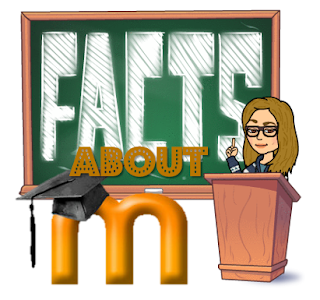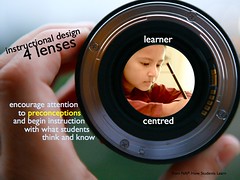"Why Moodle?" You Ask...
 |
| "moodle logo" (CC BY-NC-SA 2.0) by ShawnKball |
1. Moodle is free - and school divisions like free (especially now). But you get what you pay, or don't pay for.
2. In the Regina Catholic School Division, our Learning Online Program uses Moodle. It is easy to use (well... depends on who you talk to) and it's free.
3. I want to create a course that gives grade seven-eight students a taste of learning online and the opportunities that are offered with online courses. However in order to do this, students need to develop digital literacy and skills for learning online... so therefore I need to look at Moodle.
4. Like Sarah Wandy, I would like to offer a blended course that incorporates Moodle and face-to-face learning. This means incorporating the asynchronous space used for reflection and sharing; as well as the synchronous, which will happen offline and online depending on the topic.
5. Last year with a small team of amazing teachers, I co-developed the initial phase of a faith-based digital citizenship program within Moodle (with a lot of guidance from RCSD Learning Online). This year I want to complete the second phase of this 20 hour course that will integrate into Practical and Applied Arts, and be cross-curricular in nature. So there is no going back, I am already committed to using Moodle.
So there you have it. It's not that I'm not interested in the wonderful aspects of Schoology, Brightspace, Edmodo or Canvas, I just want to be consistent with what has been established in my school division (And no, I'm not just being status quo). Just as Rochelle Rogg mentions in her blog post that one of the factors for choosing Google Classrooms for her LMS, was because it was supported by the school division, and of course, it allows for independent and teacher led learning. Although I'm an advocate for taking risks and trying new ventures, there is something to be said for supporting school division platforms, particularly for a course that could be used by multiple classrooms.
Moodle-ishness
Last year I had a some experience exploring Moodle or at least the old version that was utilized by our school division. Then this fall with an update, quite a few things changed, mostly for the better. However, one of the aspects that was not any more desirable than pre-update was the selection of activities. To be honest, I'm not a fan. |
| "moodle logo" (CC BY-NC-SA 2.0) by ShawnKball remixed by J. Stewart-Mitchell via Bitmoji |
When I was first introduced to Moodle, I was so overwhelmed by the navigation of the digital maze, that I didn't pay much attention to the general nature of the selected activities. This time, looking around Moodle with a more "experienced eye", I started to get annoyed by the number of digital activities that resembled "shut-up sheets" (sort of like what Don Wettrick describes in his "Sit Down, Shut Up and Memorize This" post).
 |
| "New Blooms Pyramid" (CC BY-SA 2.0) by edtechworkshop |
Basically, you know the kind... handouts that encourage kids to just be quiet and complete their "work package" and do not encourage any sort of thinking beyond the first level of Bloom's Taxonomy.
These digital worksheets included activities such as: Crosswords, Cryptex, Hangman, Hidden pictures, Snakes and Ladders, Sudoku...and so forth (Later I have learned from Kirsten Hansen, that these are part of a SCORM package) Huh??? Another thing to learn! Regardless of where they come from, they all just seemed like activities that encourage just technology as a substitution for something done with paper and pencil (think, SAMR)... and tasks that really just screamed "digital busy work". As Kirsten Hansen put it in our conversation from the EC&I 834 Google Plus Community, "Moodle is primarily a learning management system with emphasis on management." Indeed - I am starting to see this now. However, rather than just lamenting about the pitfalls of the platform and questioning my intentions, instead I will concentrate on the fact that the platform is what you make it. In addition to this, focus on the importance of the teacher's role in adapting effective pedagogy in any learning space - virtual or otherwise.
There Can Be Shortcomings with the LMS... Say What?!
 |
| "Lens 1: Learner Centred" (CC BY-NC-SA 2.0) by dkuropatwa |
Regardless of the LMS or the digital tool, there will be shortcomings. Sometimes the shortcomings have as much to do with the user as they do the digital platform or tool. In her blog post, "Beyond the LMS", Audrey Watters says, "I think we like the idea that new technologies mean new practices, new affordances. But that’s not always or necessarily how technology works. The history of technology suggests otherwise. We often find ourselves adopting new tools that simply perform old tasks a wee bit better, a wee bit faster."
 |
| "Web" (CC BY-NC-ND 2.0) by SashaTikhonov |
What Audrey refers to is the fact that new tools do not make us better teachers, but instead mask approaches that are not at all focused on the needs of the learner. By the looks of it, I'm not the only one to question the application of these tools to act as smoke and mirrors for ineffective pedagogy. Lindy Olafson, in her post, LMS That is the Question, Still No Answer Though, also challenges who digital tools benefit, students or adults.
Who Owns That Content Anyways?
One aspect of the LMS that I had not totally considered was the loss of the content after a course is completed. To share an aspect that has truly got me thinking is Watters' point regarding the evaporation of student conversations, "Anything they’d written in the forums, for example, any interactions they’d had through the messaging system: gone." Some would not consider this a big deal. After all, when we engage in a meaningful class discussion face-to-face, there is no one there recording it (unless it's a first class for EC&I 834). Yet online, there is a capacity to capture it, so it does seem sad to lose those insights unveiled through the discussions. Admittedly, I get what Watters is saying. I have several years of Kidblog accounts that I have hoarded because I loved what my students wrote. But the point regarding her content that was carefully managed and organized just disappearing when she left teaching, raises the question, where did it go? When you spend many nights burning the midnight oil perfecting a lesson (or completing assignments), it starts to mean a lot. It's your content, but in adding it to the LMS, who really owns it?
 |
|
by tps58
|
Initially I had wanted the tightly secure space offered by the wall of the LMS. Now I realize that although it might be easy for teachers using this course, it's important to encourage the visitors to mingle with the residents, thereby allowing for further opportunities to learn.... This all depends of course, on the age of those travelling with you.
Video: "Visitors and Residents" via Youtube
No comments:
Post a Comment